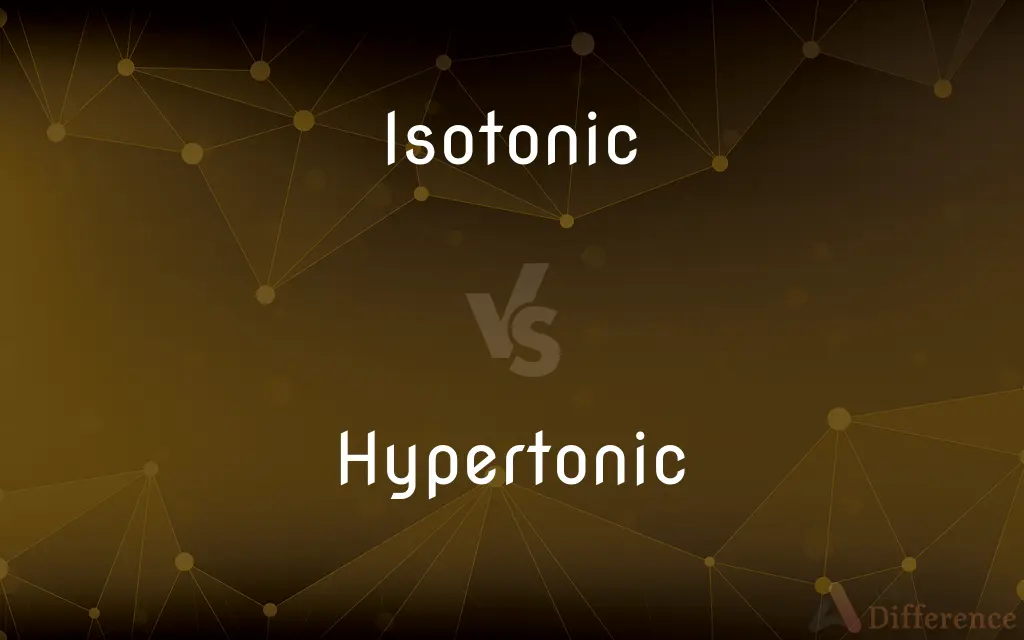Isotonic vs. Hypertonic — What's the Difference?

Difference Between Isotonic and Hypertonic
ADVERTISEMENT
Compare with Definitions
Isotonic
Of equal tension.
Hypertonic
Having a higher osmotic pressure than a particular fluid, typically a body fluid or intracellular fluid.
Isotonic
Isosmotic.
Hypertonic
Of or in a state of abnormally high muscle tone.
Isotonic
Having the same concentration of solutes as the blood
An isotonic saline solution.
ADVERTISEMENT
Hypertonic
(Physiology) Having extreme muscular or arterial tension.
Isotonic
(Physiology) Of or involving muscular contraction in which the muscle remains under relatively constant tension while its length changes.
Hypertonic
(Chemistry) Having the higher osmotic pressure of two solutions.
Isotonic
(of two solutions) Having the same osmotic pressure.
Hypertonic
(of a solution) Having a greater osmotic pressure than another.
Isotonic
(of a medical solution) Having the same concentration of solutes as human blood.
Use an isotonic saline solution in your neti pot to prevent irritation of your nasal passages.
Hypertonic
(anatomy) Having a very high muscular tension; spastic.
Isotonic
(of two muscles) Having equal tension.
Hypertonic
Having a higher osmotic pressure than a comparison solution; - of an aqueous solution. Increasing the concentration of dissolved solids increases the osmotic pressure, and thus the tonicity of a solution. Opposite of hypotonic and contrasting with isotonic.
A knowledge of the colligative properties of solutions . . . is essential for one to understand fully the principles involved in rendering intravenous solutions isotonic with blood serum, or opthalmic solutions isotonic with lachrymal fluid. Solutions thus adjusted produce less shock and much less irritation than those which are hypotonic or hypertonic, and present-day practise recognizes the desirability of making the necessary adjustments whenever possible.
Isotonic
(physiology) Of or involving muscular contraction against resistance in which the length of the muscle changes. Antonym is isometric. Isotonic movements are either concentric (working muscle shortens) or eccentric (working muscle lengthens). See also Wikipedia:Isotonic (exercise physiology)
Hypertonic
Having an osmotic pressure greater than that of blood plasma, which is approximately that of a 0.2 normal solution of sodium chloride. Cells taken from a medium of normal physiological osmolality and placed in a hypertonic medium will shrink.
Isotonic
(music) Having the same tone.
Hypertonic
In a state of abnormally high tension; - of muscle.
Isotonic
Having or indicating, equal tones, or tension.
Hypertonic
(of living tissue) in a state of abnormally high tension;
Hypertonic muscle tissue
Isotonic
Having an osmotic pressure (tonicity) equal to that of a reference solution; - of aqueous solutions. Contrasting with hypotonic and hypertonic. See hypertonic.
A knowledge of the colligative properties of solutions . . . is essential for one to understand fully the principles involved in rendering intravenous solutions isotonic with blood serum, or opthalmic solutions isotonic with lachrymal fluid. Solutions thus adjusted produce less shock and much less irritation than those which are hypotonic or hypertonic, and present-day practise recognizes the desirability of making the necessary adjustments whenever possible.
Hypertonic
(used of solutions) having the same or equal osmotic pressure
Isotonic
(of a solution) having a lower osmotic pressure than a comparison solution
Isotonic
Relating to or characterized by the equal intervals of the well-tempered scale;
Isotonic tuning
Isotonic
Of or involving muscular contraction in which tension is constant while length changes
Isotonic
Of two or more muscles; having equal tension
Share Your Discovery

Previous Comparison
Can vs. Could
Next Comparison
Custom vs. Customize














































